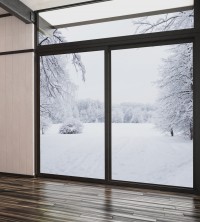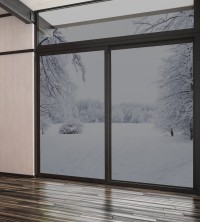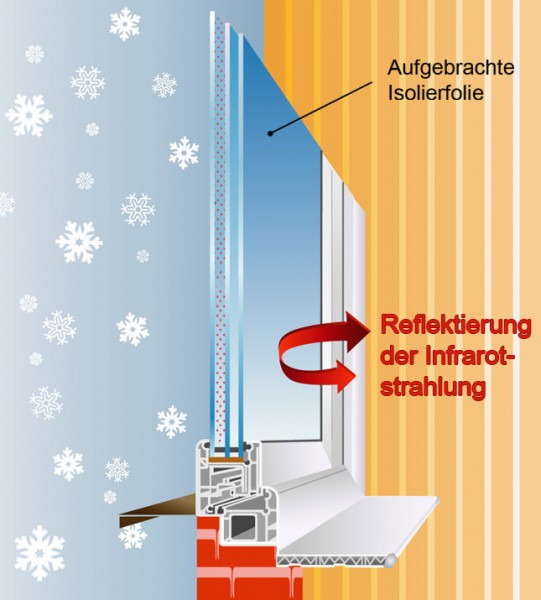
- Indoor assembly
- self-adhesive

- Indoor assembly
- self-adhesive

- Indoor assembly
- self-adhesive
Four reasons for retrofitting with thermal foil
Insulating film noticeably reduces heating costs

Energy-saving films, also called low-e films, are used to reduce heat loss at the window. The thermal film insulates the windows better by reflecting the heat (IR radiation) back into the room, thus providing effective protection against the cold. The air in the room is prevented from cooling down at the cool outside window. This saves heating costs in winter and improves the thermal insulation of the window.
In contrast to other energy-saving renovations, such as insulating the roof or walls, a cold protection film for windows does not require any major structural changes. Compared to buying and installing new windows, it is a more cost-effective retrofit solution that can be installed by anyone. Thanks to our cutting service, the insulating film is supplied to fit exactly and only needs to be placed on the inside of the window to be insulated.
The use of an insulating foil is worthwhile for these windows
Basically, the older the windows, the higher the savings potential. With single-pane glazing such as large shop windows, which naturally lose a lot of heat, the insulating films achieve the most significant effect. Retrofitting double glazing with a high Ug-value makes just as much sense. Modern triple glazing benefits to a lesser extent. Here, it depends on the individual case whether the retrofit pays for itself in a short time.
Well-being near windows increases with insulation film

In the past, radiators were often positioned directly in front of the window to counteract the cold radiating from the windows. In this case, retrofitting an insulating foil is particularly recommendable because it throws the relatively large amount of radiated heat in the immediate vicinity of the heater towards the interior like a protective shield. Without Low-E foil, the heat loss at the affected window is otherwise much higher. The heat that has just been generated by the heating system escapes unhindered through the window pane.
Another positive effect is that the cold we feel near the window is noticeably reduced when the cold protection film is installed. With your own hand, you can easily see the difference in a comparison of unfoiled and retrofitted windows. The warmer room air near the window is immediately noticeable - try it out!
Insulating foil delays the formation of condensation water
With the help of our thermal films, you can achieve the effect that the dew point on the window pane is shifted downwards by a few degrees Celsius. If, for example, condensation forms at +1°C without the film, the temperature limit for tarnishing the window can be shifted downwards by 3-4°C with the window film installed for insulation. Consequently, the window pane would only begin to form condensation at -2°C, which in practice already means a clearly noticeable effect.
Reducing room heating in summer with insulating film
All insulating films have a sun protection function of varying strength depending on the type of film, which reduces the heating up of rooms in summer. They therefore also serve as sun protection films. The total energy rejection varies from 14% with a transparent insulation film to 78% with a silver mirrored thermal film. This relieves air-conditioning systems in the summer, and energy costs are reduced a further time. The feeling of well-being increases dramatically in the now cooler rooms.
Insulating films for windows have several advantages over other methods of energy renovation of buildings:
-
Easy application: Insulating films are easy to apply and can be installed by anyone without special skills or tools.
-
Cost-effectiveness: Compared to other methods of energy retrofitting, such as replacing windows, insulating films are very cost-effective.
-
Time saving: The installation of insulating films usually takes only a few minutes and is therefore faster than other refurbishment methods.
-
No detriment to appearance: Insulating films do not usually detract from the appearance of the building as they are barely visible.
-
Effective thermal insulation: Insulating films can provide effective thermal insulation and help to reduce energy consumption in winter, thus saving costs.
FAQ's about insulating films / cold protection films
How much energy or money can be saved with insulating foil?
The amount of potential savings depends on factors such as the energy price, the quality of the windows installed and the insulating foil used. With the help of our energy saving calculator, you can work out your possible savings approximately. On average, the investment pays for itself in 2-3 years.
What are the benefits of insulating films / cold protection films?
Insulating films have a noticeable effect, especially on older panes. A special layer on the film effectively prevents the infrared radiation (room heat) from cooling down on the cold outer glazing. The perceived coldness near the window disappears.
What else are insulating foils called?
Insulating films are also called cold protection films or cold films, thermal films for windows, energy-saving films, all-season films, thermal insulation films or insulating films for windows or low-e window films. They all describe window films that reduce the heat flow through window glass (depending on the temperature gradient between the warm and cold sides) and thus reduce energy costs.
How do I stick an insulating film / cold protection film?
Insulating films have a transparent adhesive applied to the back, just like a sticker. There is a protective film on it, which must first be removed. Now the adhesive side and the pane are sprayed with water. Then the film is placed on the glass and the water is wiped out from under the film.
How do I remove insulating film / cold protection film from the window?
To remove an insulating foil, grasp it at one corner and then slowly pull it off at a wrong angle. In the case of adhesive films, the film can be warmed up beforehand with a hair dryer to dissolve the film adhesive.







